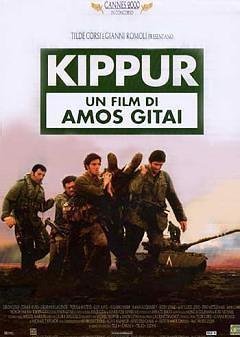“Slower than Watching Paint Dry”

| None | Light | Moderate | Heavy | |
|---|---|---|---|---|
| Language | ||||
| Violence | ||||
| Sex | ||||
| Nudity |
What You Need To Know:
KIPPUR is an Israeli movie that disappointingly, other than the title, contains nothing distinctly Jewish, which may leave viewers wondering why this movie should stand out from any other war movie. The only consistent evidence of a basic biblical or moral worldview was the commendably high regard for human life which was demonstrated by the great lengths these men went through to rescue the stranded, wounded and suffering. This was eclipsed not only by deistic philosophy and an occasional fatalistic view, but also by the movie’s explicit fornication scenes and nudity. KIPPUR had great potential – an historical context, beautiful scenery and good acting – but it never captivates its audience either with its story or its characters; therefore, it moved excruciatingly slow
Content:
(B, H, Pa, L, VV, NNN, SSS, A, D, M) Moral worldview overshadowed by deistic & fatalistic philosophy & a woman presumably engaged in eastern meditation; 4 obscenities, no profanity; moderate violence such as explosions & the aftermath of battle (including dead corpse, burned bodies & amputated limbs), yet not extremely graphic; two very graphic sex scenes; total male & female nudity; one scene shows two men consuming what appears to be alcohol; casual smoking; and, man expresses fatalistic thought yet refers to some force “up there” that must be looking out for him.
More Detail:
Directed by Amos Gitai, the movie stars an all Israeli cast, with English subtitles, and takes place at the outbreak of the 1973 Syrian attack on the nation of Israel during the Jewish holy day, Kippur. Two young friends become part of a helicopter rescue team and witness daily the casualties of battle on the front lines of war.
The only consistent evidence of a basic biblical/moral worldview was the commendably high regard for human life which was demonstrated by the great lengths these men went through to rescue the stranded, wounded and suffering. This worldview was supported by a few conversations between rescue scenes where these same men discussed the brevity of life and the encroachment of materialism. However, this was eclipsed not only by deistic philosophy and the belief that life has no meaning, but also by the movie’s explicit sex scenes.
KIPPUR had great potential to make a political and/or social statement but came up short due to the lack of character development, which would have made the story, however simple, much more compelling. One of the supporting characters briefly shares his past ties with the Holocaust and how it impacted his life, which enables viewers to see the true motivation of his character. Had this same character development occurred with the leading characters, KIPPUR would have been much more interesting. Instead, it moved painfully slow, which the long uncut single shot scenes emphasized.


 - Content:
- Content: 

